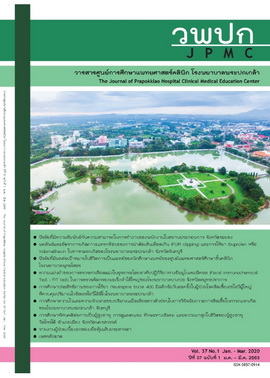Evaluation Factors may Affect The Goals of a Doctor's Life of Medical Students in Medical Education Center Buddhasothorn Hospital
Main Article Content
Abstract
Background: The Medical Education Center of Buddhasothorn Hospital is a joint institution of the collaborative project to increase the production of rural doctors. The aim is to provide rural medical doctors for the Ministry of Public Health.
Objectives: The objective of this study was to assess the real goals of a doctor’s life of medical students, and factors affecting the goals of medical students. The findings are to be used in the development of teaching and learning in accordance with the objectives of the collaborative project to increase the production of rural doctors.
Materials and methods: Data were collected from electronic questionnaires completed by the medical students in the Medical Education Center of Buddhasothorn Hospital in the academic year 2018. The factors which might be expected to be related to the goals of a doctor’s life were analyzed. A Multinomial logistic regression model was used to evaluate the factors which might affect the goals of a doctor’s life and the Pearson Chi-Square test was used to assess the correlation of factors and goals of a doctor’s life of medical students.
Results: A total of 79 medical students were enrolled. The goal of being a doctor for most respondents involved being specialized physicians working in government service in provincial hospitals or center hospitals (55.7%) while only 19% wanted to be rural doctors. However, there are no significant factors that can be used to predict the goals of a doctor’s life. For the correlation between various factors and goals, it was found that the group who wanted to be specialized physicians working in government service in provincial hospitals or center hospitals had a correlation with medical students who had participated in other activities during their study for a medical degree for the reason that it was a duty but they thought the activity was useless (Pearson’s Chi-Square 6.71, p-value = 0.01) Moreover, it was found that groups that did not want to work as doctors had a relationship with medical students who had participated in other activities during their study for a medical degree for the reason that they felt like doing it and thought it was useful (Pearson’s Chi-Square 4.47, p-value = 0.04) and was still related to the group which had participated in other activities because it was a duty but they thought the activity was useless (Pearson’s Chi-Square 15.68, p-value = 0.002).
Conclusions: According to the study, there are no factors related to rural doctors which is the main objective of producing medical graduates of the Medical Education Center of Buddhasothorn Hospital. The results of the study revealed that training programs and community-related activities may need to be improved to achieve curriculum development to inspire graduates to work as good rural doctors in order for medical students to maximize the community benefits in the rural areas.
Article Details
References
Ministry of Public Health. Thailand Health Profile 2011-2015 [Internet] Nonthaburi: Bureau of Policy and Strategy; 2016. [cited 2018 Nov 20]. Available from: https://wops.moph.go.th/ops/thp/thp/userfiles/1_artwork54_58.pdf.
Lawanont N, Pityaratstian N, Phativarakorn P. Motivation to study medicine of medical students at Faculty of Medicine, Chulalongkorn University. Chula Med J 2017;61:647–62.
Boonyoprakarn P. Factors affecting on motivation to take direct entrance examinations of medical students of faculty of medicine, Siriraj Hospital of Mahidol University [dissertation]. Bangkok: Srinakharinwirot University; 2005.
Boonnimit L. The relationships among roles of parents, teachers and peers in supporting english learning, the motivation in learning english and english learning achievement of mathayom suksa three students in schools under the Department of General Education, Bangkok Metropolis [dissertation] Bangkok: Chulalongkorn University;1999.
Chitpitaklert S, Hathirat S, Thongwilai P, Supapon S, Noknoi S, Tawaythipong O. Knowledge management in family medicine: from experience to expertise. Nakhonpathom: Office of Community Based Health Care Research and Development; 2010.
Kerdnaimongkol U, Maneesrikum T, Julrat P. A study of academic hope of adolescent students in Bangkok. J of Soc Sci & Hum. 2013; 39(2): 54-65.
Snyder CR. Conceptualizing, measuring and nurturing hope. Journal of Counseling & Development 1995;73: 355-60.
Snyder CR, Lopez SJ. Handbook of Positive Psychology. New York : Oxford University Press; 2002.
Wright S, Wong A, Newill C. The impact of role models on medical students. JGIM [Internet]. 1997[ cited 2019 Nov 8]; 12: 53-6. Available from: https://depts.washington.edu/fammed/files/Role%20Model%20Impact.pdf.
Sukumalpaiboon P, Ittiphanitphong C, Sutpasanon T, Thanbuasawan D. Which virtues of the king applicable to teach medical ethics and professionalism?. J Prapokklao Hosp Clin Med Educat Center 2018;35:372-82.

